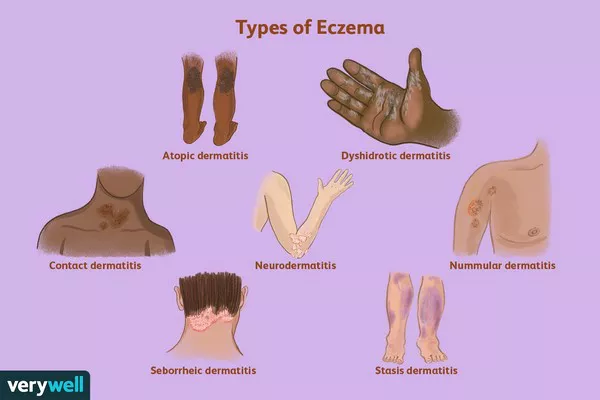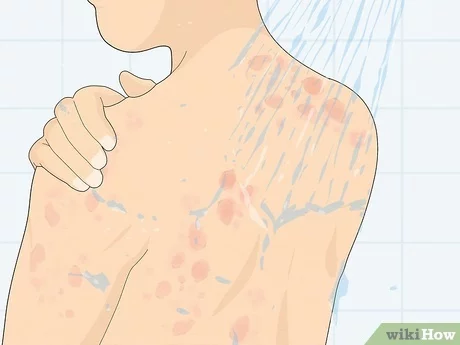Eczema, also known as dermatitis, is a common skin condition that affects millions of people worldwide. Characterized by red, inflamed, and itchy skin, eczema can significantly impact an individual’s quality of life. While the term “eczema” is often used to refer to atopic dermatitis, there are actually several different types, each with its own distinct characteristics and triggers. Understanding the various types of eczema is crucial for accurate diagnosis and effective management. In this article, we will explore the seven main types of eczema, discussing their symptoms, triggers, and treatment options.
1. Atopic Dermatitis
Atopic dermatitis is perhaps the most well-known type of eczema and is often used interchangeably with the term “eczema.” It is a chronic inflammatory skin condition characterized by dry, itchy, and inflamed patches of skin. These patches can appear anywhere on the body but are commonly found on the face, hands, elbows, and knees. Atopic dermatitis often begins in infancy or childhood and may persist into adulthood. It is associated with a family history of allergic conditions, such as asthma and hay fever.
Triggers for atopic dermatitis can vary from person to person but may include irritants like harsh soaps, detergents, and certain fabrics. Allergens such as pet dander, pollen, and dust mites can also exacerbate symptoms. Treatment typically involves moisturizing the skin, avoiding triggers, and using topical corticosteroids or immunomodulators to reduce inflammation.
2. Contact Dermatitis
Contact dermatitis is a type of eczema that occurs when the skin comes into contact with an irritant or allergen. There are two main types of contact dermatitis: irritant contact dermatitis and allergic contact dermatitis. Irritant contact dermatitis is more common and occurs when the skin is exposed to substances like harsh chemicals, solvents, or detergents. Allergic contact dermatitis, on the other hand, develops as a result of an allergic reaction to a specific substance, such as nickel, latex, or certain fragrances.
Symptoms of contact dermatitis include redness, itching, burning, and blistering in the affected area. Treatment involves identifying and avoiding the trigger substance, as well as using topical corticosteroids to reduce inflammation and relieve symptoms.
3. Nummular Eczema
Nummular eczema, also known as discoid eczema, is characterized by coin-shaped patches of inflamed skin. These patches can be intensely itchy and may ooze fluid or become crusted. Nummular eczema often appears on the arms, legs, or torso and is more common in older adults. The exact cause of nummular eczema is unknown, but it is thought to be related to dry skin, environmental factors, and genetics.
Triggers for nummular eczema may include cold, dry weather, frequent bathing, and skin injuries such as cuts or scrapes. Treatment typically involves moisturizing the skin, avoiding triggers, and using topical corticosteroids or other medications to reduce inflammation and itching.
4. Seborrheic Dermatitis
Seborrheic dermatitis is a common skin condition that primarily affects the scalp and face. It is characterized by red, greasy skin covered with yellow or white scales. In infants, seborrheic dermatitis is often referred to as cradle cap and typically resolves on its own within a few months. In adults, seborrheic dermatitis can be chronic and may flare up intermittently.
The exact cause of seborrheic dermatitis is unknown, but factors such as yeast overgrowth, hormonal changes, and genetics may play a role. Triggers for seborrheic dermatitis may include stress, cold weather, and certain medications. Treatment often involves using medicated shampoos or topical antifungal agents to reduce inflammation and control yeast growth.
5. Dyshidrotic Eczema
Dyshidrotic eczema, also known as pompholyx eczema, is characterized by small, itchy blisters that develop on the hands and feet. These blisters can be painful and may cause the skin to become red, cracked, and dry. Dyshidrotic eczema tends to occur in cycles, with flare-ups followed by periods of remission.
The exact cause of dyshidrotic eczema is unknown, but factors such as stress, allergies, and exposure to certain metals may trigger or exacerbate symptoms. Treatment typically involves keeping the affected areas clean and dry, avoiding irritants, and using topical corticosteroids or immunomodulators to reduce inflammation and itching.
6. Stasis Dermatitis
Stasis dermatitis, also known as gravitational eczema, is a type of eczema that occurs when there is poor circulation in the lower legs, leading to fluid buildup and swelling. This fluid buildup can cause the skin to become red, itchy, and inflamed. Over time, untreated stasis dermatitis can lead to changes in the skin, such as thickening, scaling, and ulceration.
Stasis dermatitis is often associated with underlying conditions such as varicose veins, obesity, and heart failure. Treatment involvesmanaging the underlying cause of poor circulation, such as wearing compression stockings, elevating the legs, and exercising regularly. Topical corticosteroids and moisturizers may also be used to relieve symptoms and reduce inflammation.
7. Neurodermatitis
Neurodermatitis, also known as lichen simplex chronicus, is a type of eczema characterized by thick, leathery patches of skin that develop as a result of repeated scratching or rubbing. These patches can be intensely itchy and may become raw, scaly, or discolored over time. Neurodermatitis often occurs in areas that are easily accessible for scratching, such as the back of the neck, ankles, or genital area.
The exact cause of neurodermatitis is unknown, but factors such as stress, anxiety, and skin irritation may contribute to its development. Treatment involves breaking the itch-scratch cycle by using topical corticosteroids, antihistamines, or other medications to reduce itching and inflammation. Behavioral therapy techniques, such as habit reversal training, may also be helpful in managing symptoms.
Conclusion
In conclusion, eczema is a complex and diverse group of skin conditions that can have a significant impact on affected individuals. By understanding the different types of eczema, along with their symptoms, triggers, and treatment options, healthcare professionals can provide more accurate diagnoses and develop tailored management plans for patients. Additionally, ongoing research into the underlying mechanisms of eczema may lead to further advancements in treatment and improved outcomes for those living with this chronic condition.

























